Research infrastructure:
Qulto RI
When talking about the professional work of academic, research and specialised libraries, more and more focus has been put on the processing and service of digital content, data and information, both subscribed and proprietary. As part of the Qulto Platform, we support the research process by hosting, aggregating and supporting the processing of documents and data, in addition to the functions of cataloguing and content delivery.
We provide and develop the necessary educational and research IT infrastructure, including e.g. the management, semantic processing and publication of research data (Open Research Data) and results (Open Access), besides data mining and solving big data issues. These developments all create a QULTO product group that is not only useful but essential for a modern educational institution.
Emerging Research Infrastructures in Hungary: the National Laboratory for Digital Heritage (DH-LAB) and the Qulto Research Infrastructure (Qulto RI)
Qulto, in collaboration with the National Laboratory for Digital Heritage, has created a hardware and software infrastructure for the processing, research, education and publication of national cultural heritage through artificial intelligence-based language processing applications (DH-LAB), developed in-house and optimised for the Hungarian language. In addition, Qulto’s research support-related product developments have resulted in a suite of products (Qulto RI) that, integrated with DH-LAB, enable complex research workflows. The DH-LAB-Qulto RI software architecture has been awarded the Emerging Research Infrastructure (RI) designation by the National Research, Development and Innovation Office in 2021.
DH-LAB and Qulto RI integrated systems include the following components:
Qulto Research Infrastructure (Qulto RI):
Digital Heritage National Laboratory (DH-LAB):
- Processing and description of research data in InvenioRDM repository
- Fine-tuneable OCR
- Proofreading of texts, and saving data necessary for teaching models
- Semantic labeling and indexing, building semantic networks
- displaying TEI XML-s
- Metarepository and TEI XML search
- Artificial intelligence-based HTR (Handwritten Text Recognition)

Award of the Emerging Research Infrastructure title by the National Research, Development and Innovation Office. The award was received by the Head of the Department of Digital Humanities of Eötvös Loránd University, DH-LAB project leader Dr. Gábor Palkó, and the owner of Qulto / Monguz Ltd., László Kármán on 16 December 2021.
QULTO RI: SUPPORTING RESEARCH PROCESSES WITH INETGRATED SOFTWARE
What is Qulto RI?
Qulto and its experts have been working with the Hungarian and European scientific communities for more than 25 years. During this time, we have partnered with five Hungarian research universities and several other research institutions, participated in several international R&D projects directly funded by the European Union, and provided infrastructural and professional support to these communities to achieve their research goals. In 2018, we started to organise the already existing legacy components into a unified research infrastructure (Qulto Research Infrastructure, QRI), integrating the relevant elements and deliverables of our two R&D grant projects and other self-funded R&D developments.
The QRI currently provides the following services:
Metadata management, digital file management, repository and data repository, plagiarism search, publication editorial system, metadata and fulltext search, data and content aggregation, semantic knowledge base, digitisation framework (proofreading, OCR, DRM), e-learning integration, publication and data visualisation.
The services provided by Qulto RI are modular, i.e. they can be made available to users in combinations as required.
Qulto RI’s software and service modules are either integrated or can be integrated with DH-LAB components, and can be offered as a common service upon demand.
Qulto Digitize
Qulto Digitize is a mass digitisation framework that provides solution for public collections, the general public and individual users as well for collaborative processing, grouping and repository management of text and image content. The main advantage of the framework is that it eliminates the need for both the use of other software and applications, and the cumbersome movement of files to be processed. Besides, it enables multi-user workflows. Unlike other document management systems on the market, Digitize is uniquely not designed to support enterprise content management – it is rather a framework that has been specifically designed to support research processes and digitisation of public collections. Digitize provides the following services:
- Creating and editing file packages (also as bulk operation)
- In case of collaborative work: assigning roles to different users
- Parameterizable OCR (also as bulk operation)
- Proofreading of OCR output files
- Generating two-layer PDF files (also as bulk operation)
- Thumbnail image generation (also as bulk operation)
- Watermarking (also as bulk operation)
- Image transformation (also as bulk operation)
- Adding metadata (also as bulk operation)
- File packages download (also as bulk operation)
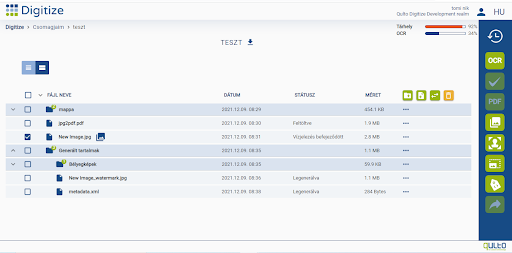
Qulto Digitize enables the management and processing of large amounts of image and text content for research groups and public collections.
Qulto Repo
Qulto Repo is a publishing repository based on the open source DSpace 7 software, which has gained popularity in recent years, especially among public education and public collections institutions. Its popularity has been mainly due to its relative ease of use, customisability and operability. In addition to the basic DSpace digital object repository functionality, Qulto Repo has add-ons such as media playback implemented by Qulto developers, record cloning and movement between collections, and Qulto Annotate for group annotation and tagging of PDF documents. Qulto Repo enables, among others, hierarchical record management, multi-level authority management, creation and linking of custom forms to collections, and easy serving, searching and filtering of digital content. In addition, it has OAI-PMH output and a REST API.

Qulto Repo is DSpace 7-based software for repository management of digital objects, supported by custom Qulto add-ons.
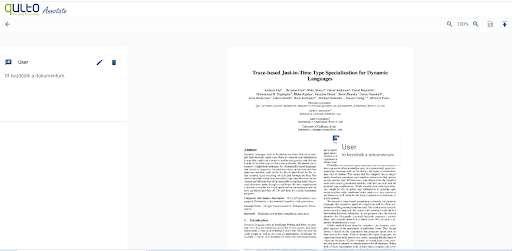
Qulto Annotate is a Qulto add-on for DSpace 7 that allows you to collaboratively annotate PDFs. Notes and annotations that are included in the file will be searchable and can be viewed, edited and deleted after saving and moving the PDF.
Qulto SimilR
Qulto SimilR is a software for finding text similarities between text documents, which can be hosted locally or as a cloud service. It allows multiple institutional and individual users to perform simultaneous analyses on individual, shared and web corpora. In addition, Qulto SimilR offers the possibility of customising the analysis and filtering parameters, taking into account the specificities of the texts in terms of genre, form and subject.
Qulto SimilR offers the possibility of confidential document management, i.e. the full text of the documents on which the analysis is based is not stored, optionally. By implementing an institution-side client, it is possible to create corpora without moving texts. This allows the institutions responsible for the management of the resources to make their textual content available without the texts being moved outside the institutional infrastructure and without the original documents being reconstructed from the underlying data outside the institutional framework.
As a result of the integration of Qulto SimilR and Qulto Repo, it is now possible to use the entire digital corpus of institutional repositories as a corpus without the user having to be actively involved in moving the corpus.
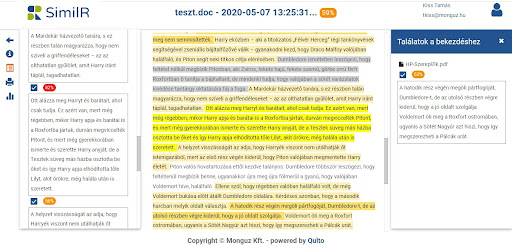
Qulto SimilR is a multifunctional text similarity analysis software that helps thesis and doctoral students and philologists in plagiarism research, critical editing and other philological research.
Discovery
Providing digital (search, browse, filter, display) content to end users in a customisable format has been made possible with the help of a catalog integrated with Qulto Repo. Discovery is capable of serving multiple sources at the same time, i.e. searching multiple repositories and library information systems symultaneously.

Discovery provides solution for delivering content managed and generated in Qulto RI to end users.
Electronic research management (ERM)
Electronic resource management is a solution for managing the selection, acquisition, licensing and access to electronic information resources (e.g. electronic journals or e-books) used by universities.
Main functions:
- content provider / aggregator registry
- availability, register of available e-resources, packages
- subscription management
- trial request, payment, expiry warning, renewal, cancellation
- e-resource access provision
- access to additional e-resource access rights linked to system
- usage logging (SUSHI)
- making reports (COUNTER)
- data visualisation
- business intelligence solutions
Publishing systems (OJS and OMP)
Open Journal Systems (OJS) and Open Monograph Press (OMP) are open source editorial systems. They are designed to facilitate peer-reviewed publishing and support the editorial workflow, including article and scholarly submission, peer review and indexing. They support different roles: editor-in-chief, editor, proofreader, author and reader.
ePublisher publication system
The Qulto ePublisher is a central service where the subscribing rightsholders – institution, publisher, institutional publisher – can upload their regulated publications and notes for online use:
- delivery of purchased or open access e-books in PDF and EPUB formats
- controlled access modes and number of simultaneous access and downloads
- provision of detailed COUNTER-based usage statistics, data visualisation
The centralised design allows for the introduction of electronic inter-library loans based on agreements between institutions and publishers, thus allowing for a more efficient use of digitised or born-digital e-publications produced by universities in Hungary.
The available e-publications can be searched and accessed through the university’s Discovery interface, and electronic textbook and note purchase can be introduced for students by adding webshop and online payment functions.
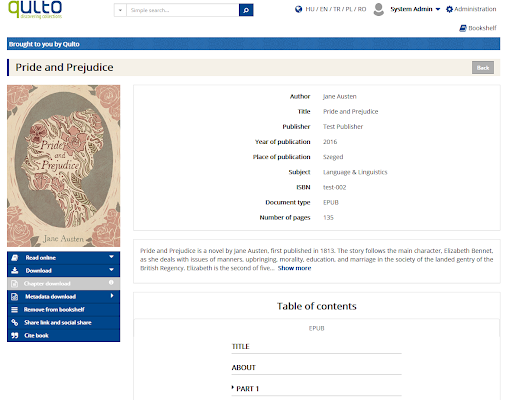
ePublisher enables the publication of regulated publications for online use by educational and research institutions and publishers.
Easy Thesis – module to manage theses
EasyThesis is a thesis management module that supports the entire process of submission, review and assessment of theses, working in conjunction with the Neptun online education system on the one hand and the institutional Discovery system on the other. It offers students a solution for recording thesis data and uploading the files required for submission. In the EasyThesis module, supervisors can carry out proofreading and checks, while opponents can perform the evaluation of works. Successfully defended theses can be automatically transferred to the institutional repository and made searchable in the institutional Discovery interface.
- student uploading of theses
- supporting the process of proofreading and evaluation of theses
- cooperation with the Neptun education system
- role-based customizable access rights management
- OAI link to institutional Discovery
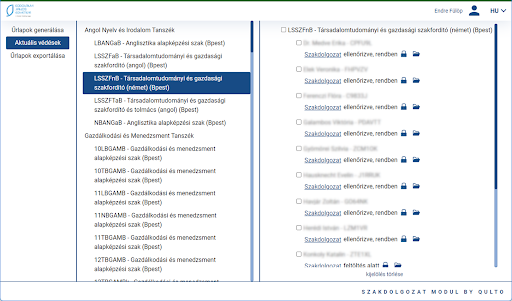
Easy Thesis supports the entire process of submitting, reviewing and assessing theses and PhD dissertations.
eCard higher education mobile application
The aim of the Qulto eCard mobile application is to make all library-related tasks of the user accessible, transparent and manageable in one place. The app’s functionality can be extended beyond the library’s scope to include all the major online services of a higher education institution.
- all reader cards in one place
- adding reader cards
- registration
- loans, renewals
- reservations, holds
- calendar/event-related features, notifications
- search for libraries and other services (Student Office, photocopying, etc.) (opening hours, contact details, route planning)
- catalog search
- biometric identification
- reader card scanning
- campus guide
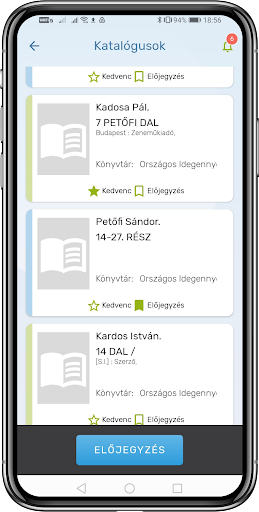
Qulto eCard brings together all the things a user needs to do with a library or university content service in one application.
Student/researcher dashboard
The Dashboard is the student/researcher’s unique, personalised view of the University Knowledge Base, accessed by logging in to the Discovery interface. The Knowledge Base provides the ability to plug in the identifiers used in the various scientific spaces (mtmtID, ORCID, scopusID, Google Scholar ID), so that the logged-in user can immediately present his/her own content.
By assigning the created ontologies and thesauri to the ontologies and thesauri connected to the Knowledge Base, the user can sort the search results according to his/her specific interests and set up notifications of new publications. Based on the student’s activity, artificial intelligence methods can be used to provide resource or even course recommendations from the Knowledge Base and connected external systems.
Instructors can generate bibliographic lists and students can generate such lists based on subject words and historical usage data.
Integrated Library System (Qulto2 platform)
The main pillar and data source of the University Knowledge Base is the University Integrated Library System. In order to integrate this component into the state-of-the-art service layer built around the Knowledge Base, we recommend upgrading the existing system to the Qulto2 Integrated Library Platform.